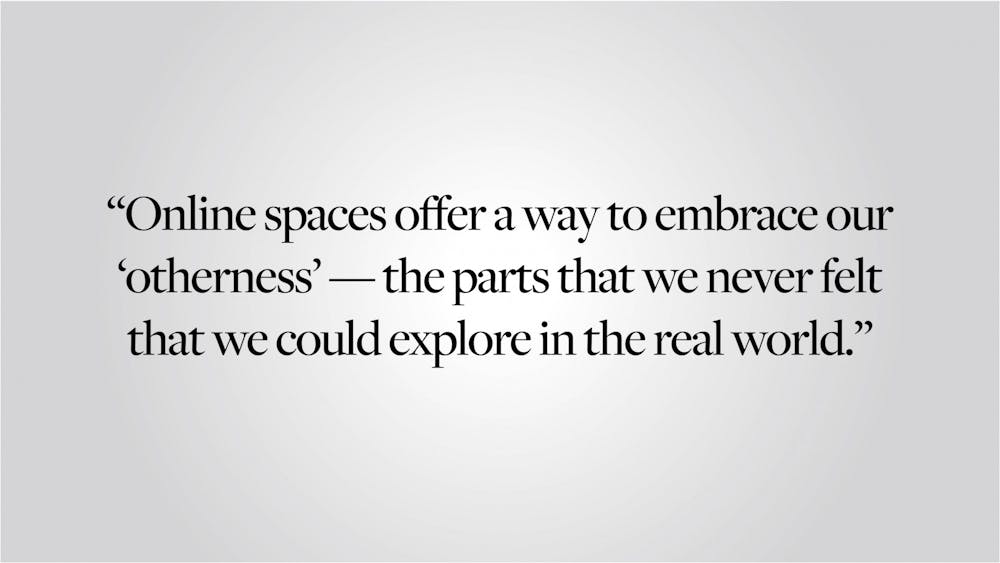Experiencing girlhood and queerness surrounded by the ubiquity of social media is at once confusing and liberating. At points, the whirlwind of information and videos and posts and strangers that social media presents is overwhelming — like a bunch of voices shouting at you all at once, telling you how to act, what to wear, who to be.
Yet young girls and queer and non-binary people have long carved out spaces for themselves in corners of the Internet where others don’t venture. From the normalization of queerness within Tumblr to women’s domination of Stan Twitter, social media and fan spaces have served as safe havens for people who have never quite felt like they fit in. These Internet spaces are often dismissed as cringey, shameful parts of our collective Internet history — even garnering criticism for furthering misogyny, as well as projecting internalized misogyny. But this interpretation overlooks the importance of these spaces in fostering comfort, connection and community on the Internet, and the crucial role that women and queer people have played in creating them.
Since the early 2010s, stan and fandom culture has aided in the development of a queer and women-led countercultural Internet movement. This movement is largely composed of social outcasts and their interests — think self-deprecating “Not-Like-Other-Girls” humor, emo bands like Fall Out Boy or My Chemical Romance and quirky Internet creators like Dan and Phil or Tyler Oakley. All of these phenomena are defined by a tendency to stray away from a mainstream culture that is heteronormative, hyper-feminized or hyper-masculinized.
There is something comforting about seeking belonging in Internet spaces — a belonging that is otherwise impossible to find in real life. There is also something distinctly queer about being ostracized by society: existing on the outskirts, looking in, navigating the tension between what the world wants us to be and how we want to authentically express ourselves. Online spaces offer a way to embrace our “otherness,” the parts that we never felt that we could explore in the real world.
More recently, the world has seen a growth in the number of safe Internet spaces, especially on TikTok, largely born out of quarantine. A lot of us have found ourselves re-adopting the online interests we had as kids. Simultaneously, the overwhelming amount of alone time during lockdown has allowed for self-discovery and self-reflection. When I turned to the Internet during this period, it was because I felt alone and unsure of myself, and it meant everything to know that there were people across the world who felt the same way.
Just as how in the early 2010s those who felt ostracized by mainstream pop culture built spaces of community online, these quarantine Internet spaces were created by people with shared fears and confusions. In both cases, women and queer and non-binary people led the way in creating corners of the Internet that felt safe. Herald Columnist Alissa Simon ’25 raises such an example in her identification of a TikTok trend that teenage girls have created, centering the mundanity of teenage girlhood — something she describes as “familiar and thrillingly boring.” Likewise, the rising popularity of LGBTQ+ TikTok content creators and educators is another way that queer people have cultivated community in the online realm.
In a world that remains aggressively straight, binary and patriarchal, queer people, non-binary people and women have spearheaded online efforts to provide spaces for those who exist outside the norm. They’ve done so since the birth of modern social media in the early 2010s, and they persist now. These efforts, born out of a sense of shared marginalization, demonstrate the power of community, even if it's through a Tumblr BTS fandom. Sometimes, when none of us knows how to carry ourselves in the mainstream, the most powerful thing we can do is be unsure together.
Melissa Liu ’25 can be reached at melissa_y_liu@brown.edu. Please send responses to this opinion to letters@browndailyherald.com and other op-eds to opinions@browndailyherald.com.





